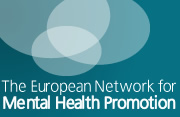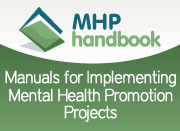Tools
- Utilities:
- Print this page
- Send this page
- Font size:
- Increase font size
- Decrease font size
Newsletter Issue No. 5
15/07/2008 - Submitted by: Tilia Bousios
Publisher: Managing Editor, Richard Wynne, Work Research Centre.
ProMenPol Partners at the High Level Conference on Mental Health and Well-Being, Brussels, 13 June 2008
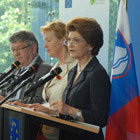
The EU took a step forward in developing community level action on mental health and well-being with the EU Pact for Mental Health and Well-being, officially launched at the EU High-Level Conference Together for Mental Health and Well- being on 13 June 2008 in Brussels. This follows on from the EU Green Paper on mental health published in 2005.
The conference was hosted by Health Commissioner Androulla Vassilliou on behalf of the European Commission, in collaboration with the Slovenian Presidency and the WHO Regional Office for Europe. Ministers, experts, researchers, European NGOs and other stakeholders came together and agreed on future joint actions to improve mental health in Europe. The Pact is a call for partnership in action. The Pact recognises the challenges in addressing mental health and suggests pooling knowledge from across the EU in order to develop commonly supported recommendations for actions in five key areas:
- prevention of suicide and depression
- mental health in youth and education
- mental health in workplace settings
- mental health in older people
- combating stigma and social exclusion
The Pact expresses the determination of Member States and stakeholders from sectors such as health, education, workplace, social affairs and civil society to engage in long-term work of exchange and cooperation on mental health and well-being in the EU. Speaking at the launch, Commissioner Vassilliou said: “Today, we in Europe have raised our voices and spoken out about the devastating effect that mental illness has on society. This Pact is a symbol of our determination in Europe to take up the challenge and deliver action in our different areas of responsibility and across the health, education and labour sectors. We need to act in partnership because mental health concerns us all."
The Pact has been carefully prepared over the last six months, drawing on the Green Paper consultations. A series of consensus papers has been produced by the EC Mental Health Process consortium, in cooperation with member states, three policy areas within the European Commission and stakeholders from a range of sectors. The papers highlight the current data, policies and state of the art on the subject and will support the implementation of the Pact. A set of Policy Briefs and a Background Paper of key facts and example activities have also been produced to support the conference.
ProMenPol partners have been active in the preparation of the consensus papers and in the conference. Karl Kuhn and Richard Wynne were closely involved with the development of the workplace consensus paper; STAKES are partners in the EC Mental Health Process consortium and SUPPORT project; and Mental Health Europe took part in the development of the consensus papers on youth and education and on older people. The President of Mental Health Europe, Malgorzata Kmita spoke at the High level Conference on social exclusion and mental health. ProMenPol was referenced as an example of cross policy action in the Background Paper for the conference produced by the SUPPORT Project.
The Pact will be put into practice through a series of thematic conferences on each of the priorities during 2009-2010.
Details of the Conference, Pact and Consensus Papers can be found on the DG SANCO website.
To access the Background Paper and a database of over eighty EU funded mental health projects, contact the SUPPORT Project at www.supportproject.eu.
For more information on the activities that Mental Health Europe has undertaken around the Pact, please write to Mari Fresu, Health Policy Officer, at mari.fresu@mhe-sme.org.
The 2nd ProMenPol Conference
ProMenPol held its second annual conference in Berlin on June 19th and 20th 2008 with mental health promotion practitioners and other experts from ten European countries. The first day of the conference focused on supporting implementation of mental health promotion in the three settings of education, workplace and older people’s residences. The second day of the conference was devoted to the practitioners’ perspective on the implementation of policy objectives regarding the EU Pact for Mental Health and Well-Being.
The Conference was opened by Dr. Karl Kuhn (BAuA), followed by Katrin Zardo who provided the conference participants with a summary of ProMenPol’s activities to date and the aims of the 2008 Conference.
The thematic opening to the conference was given by Dr. Karl Kuhn (BAuA). In his presentation Dr. Kuhn laid out core principles of mental health promotion, especially highlighting the conception of positive mental health as well as power and resilience as key concepts of mental health promotion.
The keynote speech was given by Gregor Henderson, in his capacity as an independent consultant with long and wide experience in the field of mental health promotion and as the former Director of Scotland’s National Programme for Improving Mental Health and Well-Being. His inspiring speech covered examples of good practice as well as strategies to obtain support for mental health promoting activities.
Dr. Donal McAnaney (Rehab) and Richard Wynne (WRC) then took up the baton and presented the ProMenPol database and toolkit which was followed by Tilia Boussios (Eworx) and Leonie Lynch (WRC), who provided a practical demonstration on how to find tools in the ProMenPol Database and gave an overview of tools included in the database and toolkit.
As the database/toolkit aims to be user-oriented, easy to implement and near to practice, Gert Lang and Tilia Boussios encouraged participants to help the ProMenPol team improve the toolkit by evaluating the toolkit using the ProMenPol Usability Questionnaire (Field Trial Type I). Additionally, Gert Lang (FRK) presented Field Trial Types II and III.
During the workshops, practitioners shared their experiences of and prospects for implementing MHP tools - these discussions proved to be lively and enlightening. Following on from the workshop reports, Dr. Donal McAnaney (Rehab) raised awareness of ethical issues in mental health promotion thereby concluding the first conference day.
The second day of the conference commenced with a presentation by Mary van Dievel (MHE) and Chris O’Sullivan (SUPPORT project) on the European Pact on Mental Health and Well-Being and its development process.
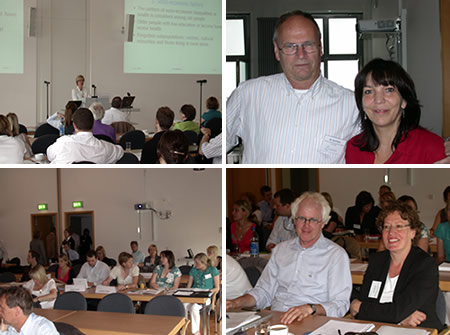 A more detailed insight on EU policy was provided by Dr. Airi Värnik (ERSI) - focusing on suicide prevention and mental health in youth and education, by Dr Richard Wynne (WRC) – focusing on mental health in workplace environments - and by Dr Eija Stengård (STAKES) - focusing on mental health for older people.
A more detailed insight on EU policy was provided by Dr. Airi Värnik (ERSI) - focusing on suicide prevention and mental health in youth and education, by Dr Richard Wynne (WRC) – focusing on mental health in workplace environments - and by Dr Eija Stengård (STAKES) - focusing on mental health for older people.
The presentations were followed by the second conference workshop Bottom up Policy Making - Empowering the Voice of the Practitioner where participants discussed possibilities to foster mental health promotion at EU-level in the future as well as highlighting important lessons from practice that are of interest to and can be used to influence policy makers.
The Second ProMenPol Conference turned out to be a resounding success, not only because of the great response to the Field Trials but also due to the qualitative and constructive practitioners’ feedback to the European Pact. This practitioners’ feedback will be carried forward to European policy makers at the Second ProMenPol Policy Workshop, which will take place in December 2008.
The presentations associated with the 2008 ProMenPol Conference are now available on the website, whereas a full conference report will be published shortly.
Recent Developments in ProMenPol

Numerous activities have been taking place in ProMenPol since the publication of the last newsletter. The ProMenPol Toolkit and Database are now fully functioning and can be accessed from the ProMenPol website. To date some 364 tools are available in the ProMenPol database of which 155 are associated with the education setting, 100 with the older peoples’ residences and 109 with the workplace settings. These tools are now available in five languages (English, German, Finnish, Estonian and Dutch).
The ProMenPol Toolkit is made up of a sub-set of the database tools. The tools in the Toolkit have been selected by the ProMenPol team as being the best available tools from the ProMenPol database. They are organised into a 4 step implementation process model (see below), which allows for easy identification of the target of the tools within the Toolkit. A more detailed description is provided on the ProMenPol website.
In addition to ProMenPol partners surveying tools, people and organisations from outside the project are encouraged to add tools to the database. This involves becoming a registered user of the project website and then going to the toolkit/database area to enter the details of your mental health promotion tool. Instructions on how to complete the pro-formas for tool descriptions are provided.
Field Trials and Registration for Participation
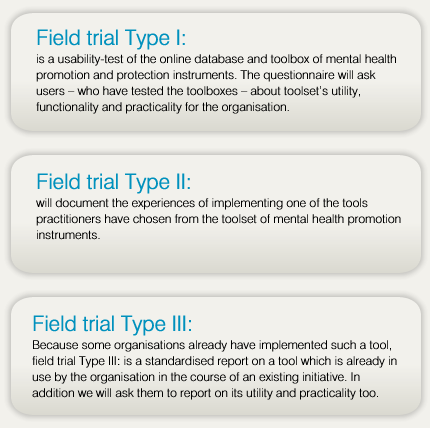 Following the completion of the 2nd ProMenPol Conference, the ProMenPol field trials have begun. 51 organisations from ten different countries and from various settings have stated their interest in conducting a field trial. 31 of the organisations that have expressed an interest originate from the workplace setting, eleven from schools and eight from the setting for older people. ProMenPol will support the field trial participants by means of a manual, e-forums, ethics vision & questionnaire, ProMenPol ethical advice, the project contact partners, a summary form, the ProMenPol website, database & toolkit and of course via the ProMenPol-Network.
Following the completion of the 2nd ProMenPol Conference, the ProMenPol field trials have begun. 51 organisations from ten different countries and from various settings have stated their interest in conducting a field trial. 31 of the organisations that have expressed an interest originate from the workplace setting, eleven from schools and eight from the setting for older people. ProMenPol will support the field trial participants by means of a manual, e-forums, ethics vision & questionnaire, ProMenPol ethical advice, the project contact partners, a summary form, the ProMenPol website, database & toolkit and of course via the ProMenPol-Network.
In the meantime interested organisations can express their interest in undertaking a field trial. If you are interested, please send an e-mail to Gert Lang of the Research Institute of the Viennese Red Cross (gert.lang@w.redcross.or.at) and ask for the “expression of interest”-form. For more detailed information about the field trials please visit our homepage. There is also a marketing flyer available.

